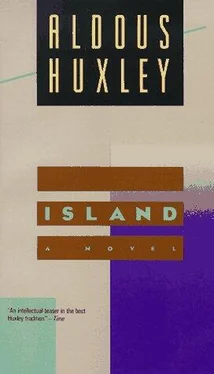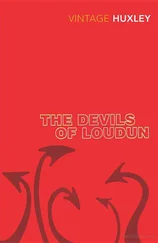Aldous Huxley - Island
Здесь есть возможность читать онлайн «Aldous Huxley - Island» весь текст электронной книги совершенно бесплатно (целиком полную версию без сокращений). В некоторых случаях можно слушать аудио, скачать через торрент в формате fb2 и присутствует краткое содержание. Жанр: Социально-психологическая фантастика, на английском языке. Описание произведения, (предисловие) а так же отзывы посетителей доступны на портале библиотеки ЛибКат.
- Название:Island
- Автор:
- Жанр:
- Год:неизвестен
- ISBN:нет данных
- Рейтинг книги:3 / 5. Голосов: 1
-
Избранное:Добавить в избранное
- Отзывы:
-
Ваша оценка:
- 60
- 1
- 2
- 3
- 4
- 5
Island: краткое содержание, описание и аннотация
Предлагаем к чтению аннотацию, описание, краткое содержание или предисловие (зависит от того, что написал сам автор книги «Island»). Если вы не нашли необходимую информацию о книге — напишите в комментариях, мы постараемся отыскать её.
Island — читать онлайн бесплатно полную книгу (весь текст) целиком
Ниже представлен текст книги, разбитый по страницам. Система сохранения места последней прочитанной страницы, позволяет с удобством читать онлайн бесплатно книгу «Island», без необходимости каждый раз заново искать на чём Вы остановились. Поставьте закладку, и сможете в любой момент перейти на страницу, на которой закончили чтение.
Интервал:
Закладка:
She opened a green door.
"Well, now you know," Will heard a familiar voice saying. "Nobody has to feel pain. You told yourselves that the pin wouldn't hurt-and it didn't hurt."
They stepped into the room and there, very tall in the midst of a score of plump or skinny little brown bodies, was Susila MacPhail. She smiled at them, pointed to a couple of chairs in a corner of the room, and turned back to the children. "Nobody has to feel pain," she repeated. "But never forget: pain always means that something is wrong. You've learned to shut pain off, but don't do it thoughtlessly, don't do it without asking yourselves the question: What's the reason for this pain? And if it's bad, or if there's no obvious reason for it, tell your mother about it, or your teacher, or any grown-up in your Mutual Adoption Club. Then shut off the pain. Shut it off knowing that, if anything needs to be done, it will be done. Do you understand? . . . And now," she went on, after all the questions had been asked and answered. "Now let's play some pretending games. Shut your eyes and pretend you're looking at that poor old mynah bird with one leg that comes to school every day to be fed. Can you see him?"
Of course they could see him. The one-legged mynah was evidently an old friend.
"See him just as clearly as you saw him today at lunchtime. And don't stare at him, don't make any effort. Just see what comes to you, and let your eyes shift-from his beak to his tail, from his bright little round eye to his one orange leg."
"I can hear him too," a little girl volunteered. "He's saying 'Karuna, karuna!'"
"That's not true," another child said indignantly. "He's saying 'Attention!' "
"He's saying both those things," Susila assured them. "And probably a lot of other words besides. But now we're going to do some real pretending. Pretend that there are two one-legged mynah birds. Three one-legged mynah birds. Four one-legged mynah birds. Can you see all four of them?"
They could.
"Four one-legged mynah birds at the four corners of a square, and a fifth one in the middle. And now let's make them change their color. They're white now. Five white mynah birds with yellow heads and one orange leg. And now the heads are blue. Bright blue-and the rest of the bird is pink. Five pink birds with blue heads. And they keep changing. They're purple now. Five purple birds with white heads and each of them has one pale-green leg. Goodness, what's happening! There aren't five of them; there are ten. No, twenty, fifty, a hundred. Hundreds and hundreds. Can you see them?" Some of them could- without the slightest difficulty; and for those who couldn't go the whole hog, Susila proposed more modest goals.
"Just make twelve of them," she said. "Or if twelve is too many, make ten, make eight. That's still an awful lot of mynahs. And now," she went on, when all the children had conjured up all the purple birds that each was capable of creating, "now they're gone." She clapped her hands. "Gone! Every single one of them. There's nothing there. And now you're not going to see mynahs, you're going to see me. One me in yellow. Two mes in green. Three mes in blue with pink spots. Four mes in the brightest red you ever saw." She clapped her hands again. "All gone. And this time it's Mrs. Narayan and that funny-looking man with a stiff leg who came in with her. Four of each of them. Standing in a big circle in the gymnasium. And now they're dancing the Rakshasi Hornpipe. 'So stamp it out, so stamp it out.' "
There was a general giggle. The dancing Wills and Principals must have looked richly comical.
Susila snapped her fingers.
"Away with them! Vanish! And now each of you sees three of your mothers and three of your fathers running round the playground. Faster, faster, faster! And suddenly they're not there any more. And then they are there. But next moment they aren't. They are there, they aren't. They are, they aren't..."
The giggles swelled into squeals of laughter and at the height of the laughter a bell rang. The lesson in Elementary Practical Psychology was over.
"What's the point of it all?" Will asked when the children had run off to play and Mrs. Narayan had returned to her office.
"The point," Susila answered, "is to get people to understand that we're not completely at the mercy of our memory and our phantasies. If we're disturbed by what's going on inside our heads, we can do something about it. It's all a question of being shown what to do and then practicing-the way one learns to write or play the flute. What those children you saw here were being taught is a very simple technique-a technique that we'll develop later on into a method of liberation. Not complete liberation, of course. But half a loaf is a great deal better than no bread. This technique won't lead you to the discovery of your Buddha Nature: but it may help you to prepare for that discovery-help you by liberating you from the hauntings of your own painful memories, your remorses, your causeless anxieties about the future."
" 'Hauntings,' " Will agreed, "is the word."
"But one doesn't have to be haunted. Some of the ghosts can be laid quite easily. Whenever one of them appears, just give it the imagination treatment. Deal with it as we dealt with those mynahs, as we dealt with you and Mrs. Narayan. Change its clothes, give it another nose, multiply it, tell it to go away, call it back again and make it do something ridiculous. Then abolish it. Just think what you could have done about your father, if someone had taught you a few of these simple little tricks when you were a child! You thought of him as a terrifying ogre. But that wasn't necessary. In your fancy you could have turned the ogre into a grotesque. Into a whole chorus of grotesques. Twenty of them doing a tap dance and singing, 'I dreamt I dwelt in marble halls.' A short course in Elementary Practical Psychology, and your whole life might have been different."
How would he have dealt with Molly's death, Will wondered as they walked out towards the parked jeep. What rites of imaginative exorcism could he have practiced on that white, musk-scented succubus who was the incarnation of his frantic and abhorred desires?
But here was the jeep. Will handed Susila the keys and laboriously hoisted himself into his seat. Very noisily, as though it were under some neurotic compulsion to overcompensate for its diminutive stature, a small and aged car approached from the direction of the village, turned into the driveway and, still clattering and shuddering, came to a halt beside the jeep.
They turned. There, leaning out of the window of the royal Baby Austin, was Murugan, and beyond him, vast in white muslin and billowy like a cumulus cloud, sat the Rani. Will bowed in her direction and evoked the most gracious of smiles, which was switched off as soon as she turned to Susila, whose greeting was acknowledged only with the most distant of nods.
"Going for a drive?" Will asked politely.
"Only as far as Shivapuram," said the Rani.
"If this wretched little crate will hold together that long," Murugan added bitterly. He turned the ignition key. The motor gave a last obscene hiccup and died.
"There are some people we have to see," the Rani went on. "Or rather One Person," she added in a tone charged with conspiratorial significance. She smiled at Will and very nearly winked.
Pretending not to understand that she was talking about Bahu, Will uttered a noncommittal "Quite," and commiserated with her on all the work and worry that the preparations for next week's coming-of-age party must entail.
Murugan interrupted him. "What are you doing out here?" he asked.
"I've spent the afternoon taking an intelligent interest in Palanese education."
"Palanese education," the Rani echoed. And again, sorrowfully, "Palanese" (pause) "Education." She shook her head.
Читать дальшеИнтервал:
Закладка:
Похожие книги на «Island»
Представляем Вашему вниманию похожие книги на «Island» списком для выбора. Мы отобрали схожую по названию и смыслу литературу в надежде предоставить читателям больше вариантов отыскать новые, интересные, ещё непрочитанные произведения.
Обсуждение, отзывы о книге «Island» и просто собственные мнения читателей. Оставьте ваши комментарии, напишите, что Вы думаете о произведении, его смысле или главных героях. Укажите что конкретно понравилось, а что нет, и почему Вы так считаете.











